#Conversion therapy
Photo

Countries where "conversion therapy" is still legal, 2023.
1K notes
·
View notes
Text
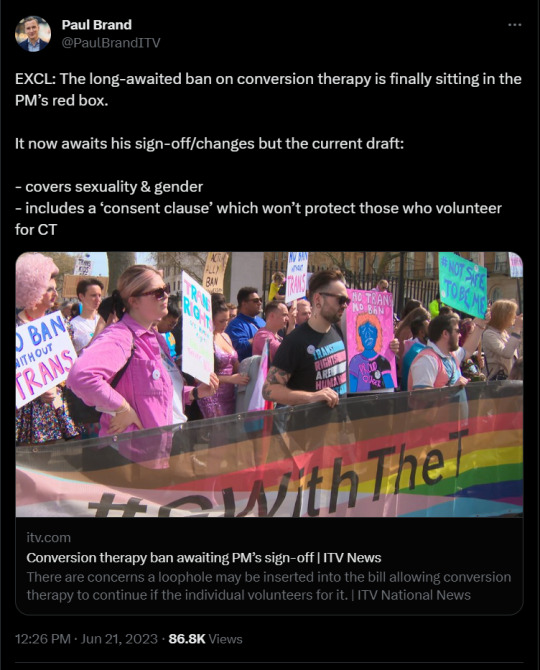
You're going to hear a certain (Tory) contingent celebrating that they've 'Banned conversion therapy' but unfortunately the legislation including a 'consent clause' which makes it hugely ineffective.
Nobody 'volunteers' for conversion therapy.
807 notes
·
View notes
Text
From the short article:
When we think of conversion therapy, we usually think of right-wing religious groups trying to "cure" people of queerness. Some asexual people encounter this type of conversion therapy. Most encounter something different—less religious and more medicalized.
Medicalized conversion therapy often involves treating asexuality (or feelings of low/no sexual interest) as the result of hormone imbalances, trauma, or mental health issues. Treating asexuality as a medical issue is a form of conversion therapy.
284 notes
·
View notes
Text
//On Friday (9 June), the Nordic country joined Canada, Brazil, Ecuador, Spain, Germany, France, Malta and New Zealand in banning harmful conversion practices.
Not a single representative voted against the bill, proposed by Viðreisnar parliamentary party chair and Reform Party MP Hanna Katrín Friðriksson, with 53 voting ‘yes’ and three abstaining.
Friðriksson has previously said that conversion practices are “based purely on ignorance and reactionary ideas” and have “no place in our society”, according to the Reykjavik Grapevine.
According to Ugla Stefanía Kristjönudóttir Jónsdóttir, a writer and expert on LGBTQ+ issues in Iceland, the overwhelming majority voting for the ban in the Althingi (Icelandic parliament) showed that the legislation was widely supported, even after transphobic attempts to kill it.//

482 notes
·
View notes
Text
I’m crying at this bait and switch.
Taylor put the name of a doctor who used electroshock therapy in an attempt to “cure” homosexuality in So Long London
The first few times I listened to the song I noticed it sounded like she said “heath” instead of “hearth” in the second verse. I googled the definition and couldn’t make any sense of the noun’s significance “a tract of level, uncultivated land with sandy soil and scrubby vegetation.”
So I googled “heath LGBT” and the very first result was the Wikipedia entry for Robert Heath, a psychiatrist born in 1915. And lo and behold, he practiced electro shock therapy on subjects, to attempt a “cure” for homosexuality.
Then I googled the lyrics to SLL just to be sure I was hearing them correctly. Not only does she indeed sing heath, not hearth, but in the lyrics, heath is capitalized
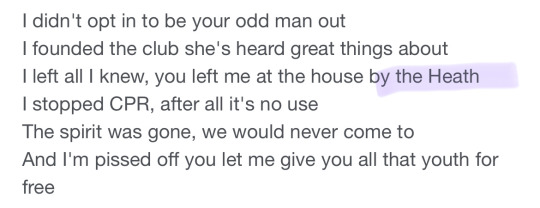
I’m shaking. Despite already believing the music video to be a direct reference to conversion therapy, this sneaky and hidden in plain sight confirmation has me overcome with emotion for Taylor. For everything she’s endured.
We see you Taylor, we love you 🤍
Content warning on the below description of this sicko’s “studies”
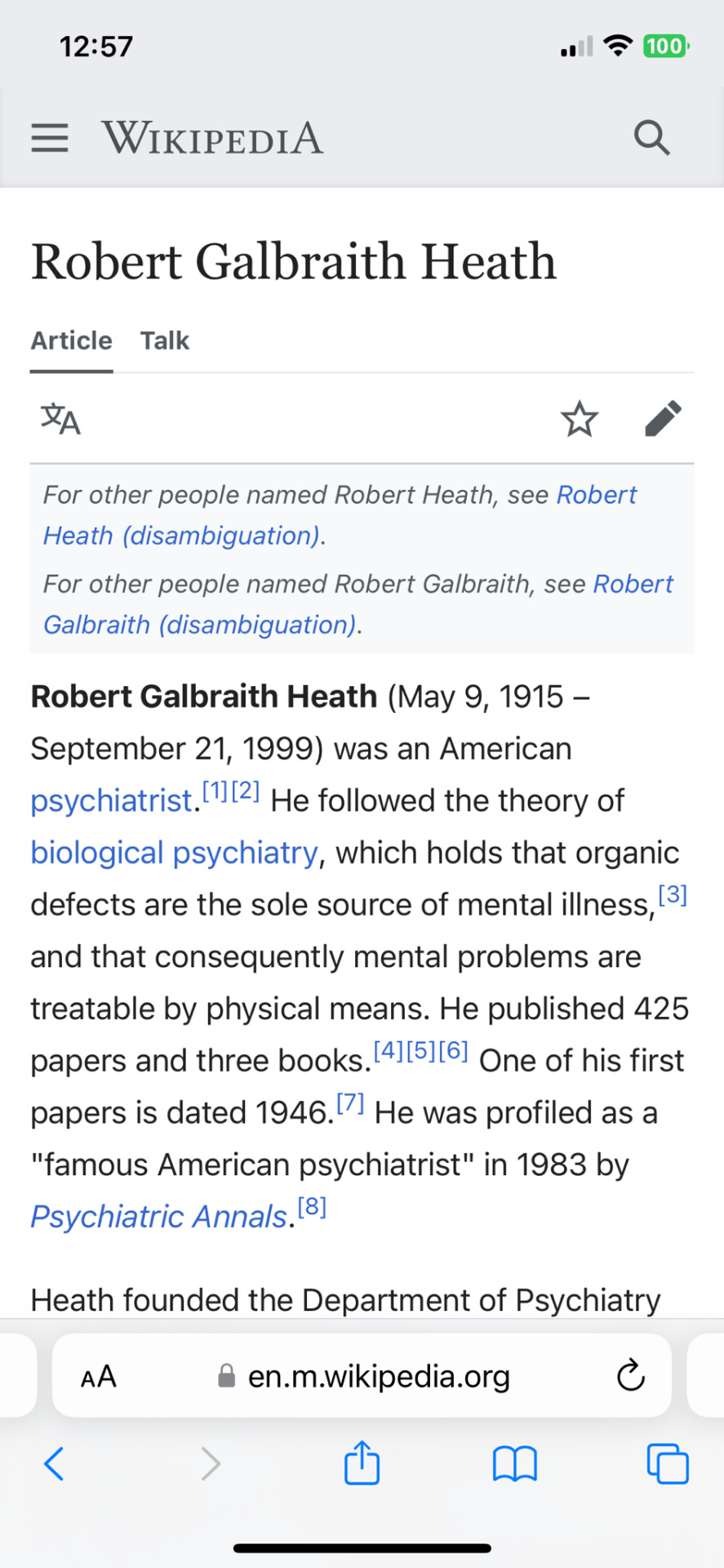
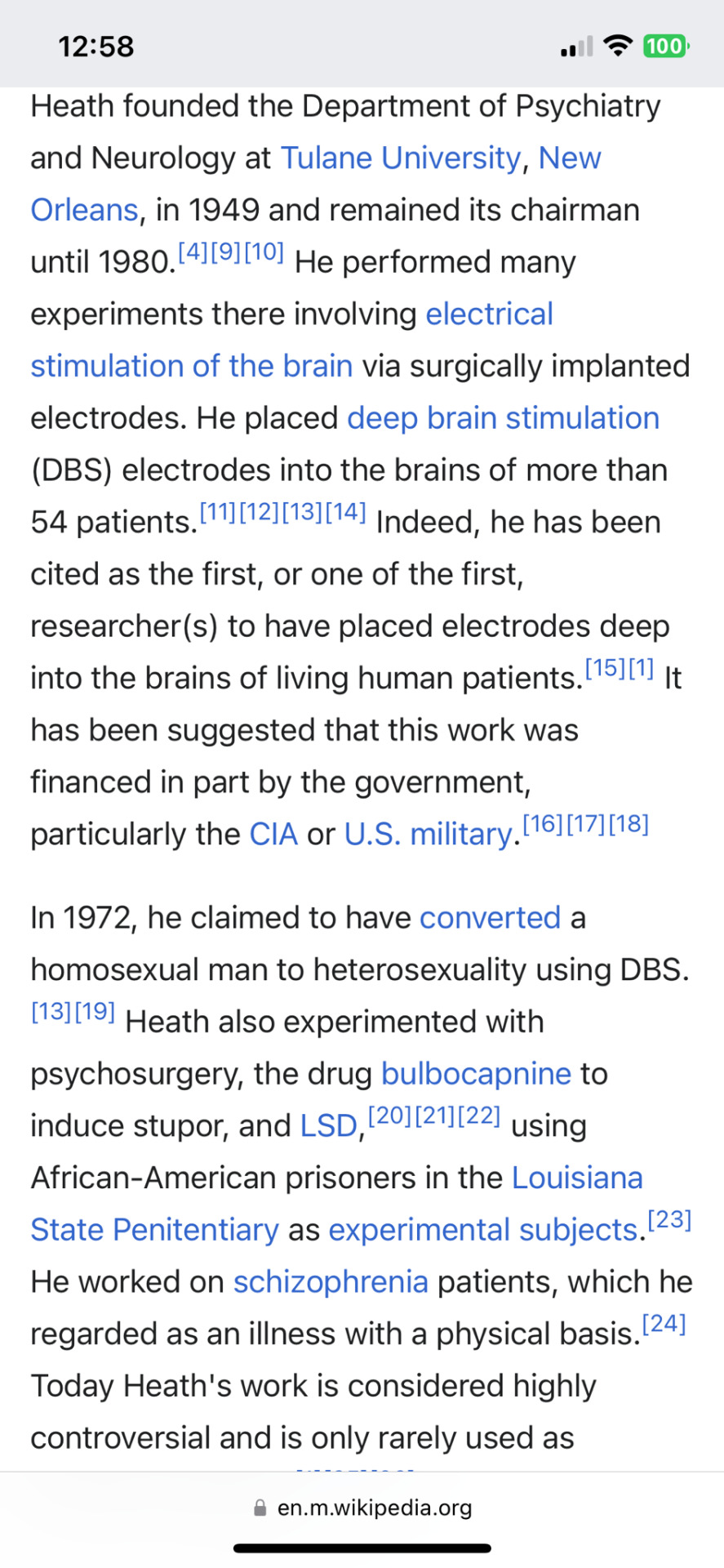
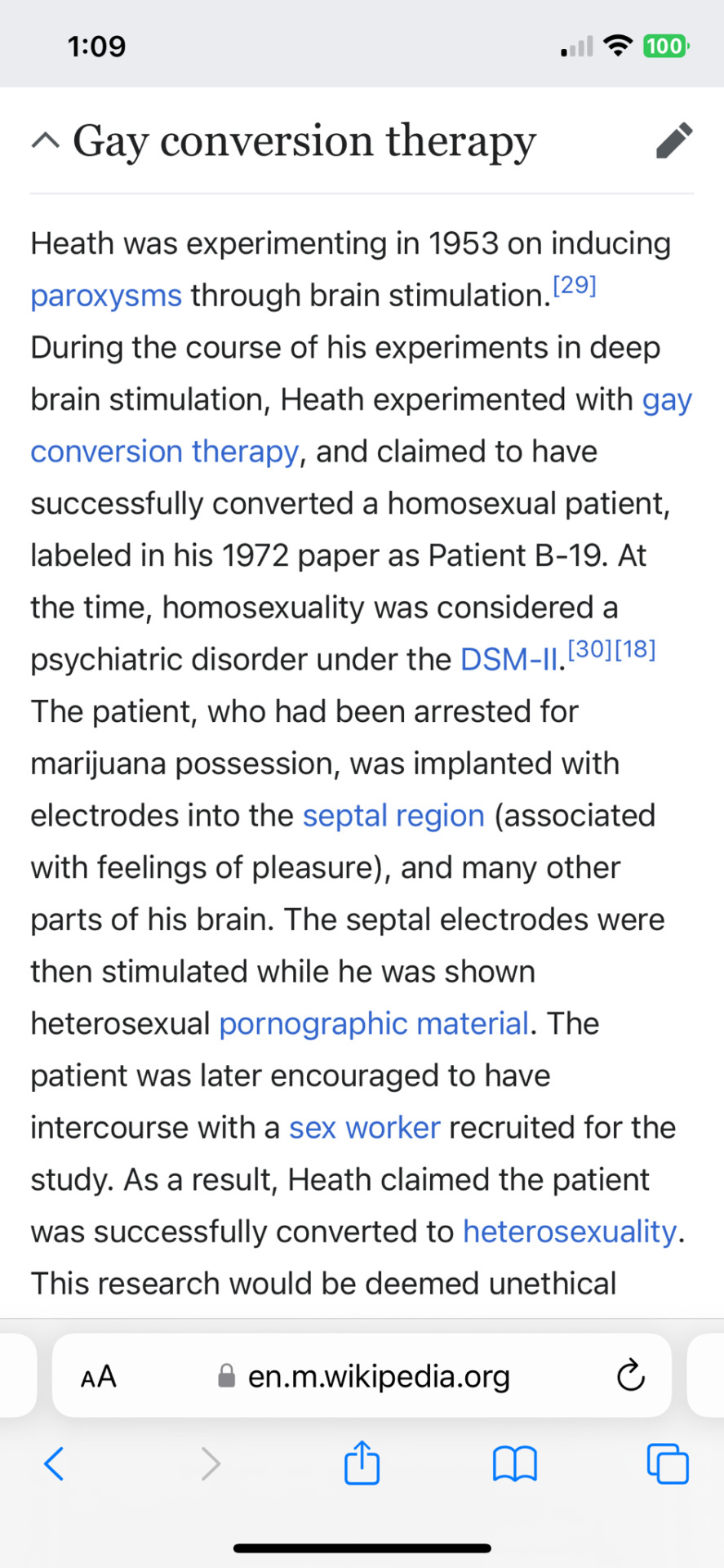
54 notes
·
View notes
Text
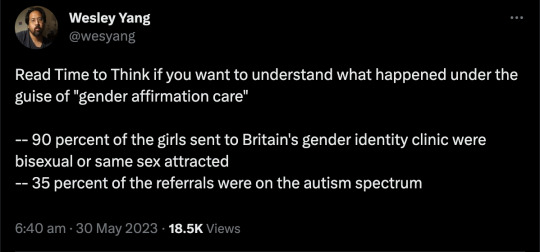

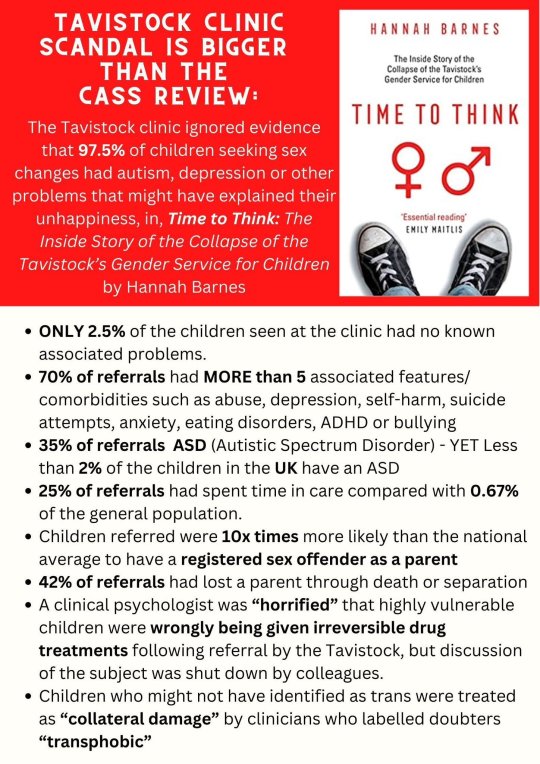
The Tavistock performed gay conversion therapy in broad daylight, while undertaking medical experiments on kids with autism spectrum disorder (ASD).
https://www.thetimes.co.uk/article/it-feels-like-conversion-therapy-for-gay-children-say-clinicians-pvsckdvq2
So many potentially gay children were being sent down the pathway to change gender, two of the clinicians said there was a dark joke among staff that “there would be no gay people left”.
“It feels like conversion therapy for gay children,” one male clinician said. “I frequently had cases where people started identifying as trans after months of horrendous bullying for being gay,” he told The Times.
Transing the gay away is what Iran does.
#Wesley Yang#Tavistock#Time to Think#Hannah Barnes#gender affirming care#gay conversion therapy#conversion therapy#autism#autism spectrum#queer theory#gender ideology#mental health issues#mental health#medical malpractice#medical corruption#medical scandal#trans the gay away#trans away the gay#religion is a mental illness
268 notes
·
View notes
Note
Feel free to ignore this because I’m sure you’re well beyond tired of “ace discourse” at this point but I’m curious if you’ve seen the recent studies claiming that asexuals are more likely to be offered conversion therapy than LGBT people, and if you have any thoughts on it?
Means absolutely nothing to me because in this context... it's clear no one involved knows what the term "conversion therapy" means, as aces have been watering down the term for almost a decade now, making it to mean "any attempt to change your sexuality" which has ALSO been watered down to mean "any ace being asked if they have depression, sexual trauma, or possibly a hormonal condition and if they want treatment for that."
Conversion therapy (in the context of sexuality, not gender which is similar but not identical, though it often involves sexuality based CT as well) is a fairly specific thing--it involves some authoritative figure (a "therapist," a priest, an "ex gay guru") trying to do two things--erase same gender attraction, often through forcing the person to associate it with shame/pain/disgust/nausea, and to force them to act as it they experience "correct" attraction.
Conversion therapy is often viewed as "successful" if only the first step is complete. As in, the person comes out unable to enjoy/experience/recognize their same gender attraction. They could go the rest of their life celibate, not dating, not marrying and it is successful enough. Best case scenario, they can marry someone of the "right" gender, MAYBE have sex, MAYBE have kids but... the lack of tangible gayness is enough. (NO, I am not saying conversion "therapists" want people to identify as asexual or aromantic, just that they don't mind if gay and bisexual people feel NO attraction/desires when they are done with them.)
Understanding conversion therapy is about destroying sexual attraction, romantic attraction in gay and bisexual people means it is impossible to link up with anti-ace "conversion therapy." There is none. There is no organization or group vying for people to experience sexual attraction in that way. Who are tormenting, abusing people into feeling attraction.
This is especially obvious when you realize... that the argument because "There are organizations that want gay and bisexual asexuals to experience sexual attraction." Run by who? Where? What are they doing to force gay people to want to have sex?
Like... is this just for straight aces then? Can you name a single group in the world that believes in conversion therapy that WANTS gay sexual desires? Gay romantic desire?
So, conversion therapy for aces doesn't exist. Not any systemic level. Are aces being abused, harassed via rape culture? Sure but that isn't conversion therapy.
What aces often claim is the hypothetical "HSDD diagnosis, which Ive debunked as aphobia... years ago.
Hypoactive Sexual Desire Disorder is a SUDDEN LOSS of sexual attraction COMBINED with DISTRESS at said sudden loss. The DSM EXPLICITLY has an exception for lifelong HSDD--if you have never experienced sexual attraction, no one cares. If you experience DISTRESS at lack of *libido*, doctors may offer exploring potential help on that front... and counseling to accept that maybe you never will.
There is no forced, coercive treatment. If you experience sudden loss of sexual desires (LIBIDO, NOT ATTRACTION), they may test for depression, hormonal changes, cancer, and other potential causes... if you want them to. You're offered counseling for the distress.
HSDD is the type of shit men get viagra for.
Surveys like this are suggesting being prescribed viagra is conversion therapy.
Honestly, the fact that the survey is about conversion therapy being OFFERED, when often it is a COERCIVE practice against minors or vulnerable adults in faith settings, is kinda all the proof you need that what they are discussing is not conversion therapy.
But rather an uncomfortable moment at the doctors where the doctor asks questions they don't like, just to rule out potential health issues.
ANYWAYS ANY ATTEMPT TO ARGUE WITH ME WILL JUST BE MET WITH MY TARGET WISHLIST. I ALSO DON'T WANT ANONS AGREEING WITH ME. I WANT THIS TO BE ONE AND DONE POST
#ace discourse#HSDD#conversion therapy#most claims of aphobia involve intentionally#misusing terminology#to frame anti-ace experiences as ONLY/specifically anti-ace#or as worse than they actually are#it's almost all appropriative#to the expense of the groups theyre claiming to share experiences with
71 notes
·
View notes
Text
I think it's so sexy, when people treat us as subhuman. Idk. It just makes my pussy so wet, when politicians strip us from our rights. Yeah, that's what I deserve. Show me how disgusting I am. Fuck me back into a good girl.
I think it would so beneficial for us, ftm girls, if instead of trying to ruin our perfectly healthy and beautiful female body, we get sent to conversion therapy where they teach us how to fulfil our roles as women in society. There's no need to mutilate our bodies, we should just listen to men! If a girl resists, she should go through corrective rape just to make sure she understands that she can never become an actual man.
Let me know, if anyone is interested in fixing me! :)
#detrans me#ftm misgendering#fake boy#detransition kink#patriarchy kink#ftm correctional therapy#forced detrans#ftm girl#fakeboy#ftm detrans kink#detrans ftm#detrans kink#corrective rape#conversion therapy#misgender me#misgender kink#misgen#misgendering blog#ftmtf kink#detrans
160 notes
·
View notes
Text
OTTAWA - Despite a federal ban on conversion therapy being in place for more than a year, advocates fear the broader ideologies underpinning the practice continue to have a strong foothold in Canada.
New Criminal Code offences came into effect in January 2022, but it appears no charges or prosecutions have yet taken place.
Conversion therapy is the practice of attempting to change an individual's sexual orientation to heterosexual or to change their gender identity to match the sex they were assigned at birth.
Nick Schiavo, executive director of No Conversion Canada, said he is worried about the possibility that those who wish to influence a person's sexual orientation may use "coded language" to avoid falling under the law. [...]
Continue Reading.
Tagging: @politicsofcanada
248 notes
·
View notes
Link
467 notes
·
View notes
Photo

Countries where "conversion therapy" is still legal.
343 notes
·
View notes
Note
Hi! I've tried looking for it myself, but I've only found two results and both were in languages I don't speak, so I think it's time to call in the experts :)
I'm looking for GO fics which talk about conversion therapy, I figured there must be some seeing as there are many queer and religious themes in Good Omens but so far I haven't had any luck finding them!
Thank you for your help, your patience and your hard work 💚
Hello! These are the only fics I can find that even mention conversion therapy...
The Truth by mordelle (T)
Adam and Warlock to dinner and Aziraphale is forced to talk about his bleak past.
Wednesday by originaldaniphantom (T)
Channeling Matilda and my Evangelism-infused upbringing:
Crowley and Aziraphale are surrogate gay dads to a lil bby queer.
fast times at south downs university by littlesnowpea (T)
It’s 2:46 p.m. on a rainy Tuesday in March that Anathema Device, a Women’s History lecturer at South Downs University, realises the following things:
She’s forgotten her umbrella again.
Dr. Fell, the head of the English Department, offers to share his as they walk into campus together, and
Dr. Fell is married.
This is significant not because Dr. Fell shared his umbrella – he’s shared his umbrella many times before, and is quite generous – but instead is significant because in the entire two years Anathema Device has taught at South Downs University, she never knew Dr. Fell was married.
So Much to be Consoled as to Console by Arokel (T)
“What are you,” Crowley drawled, “the patron saint of queer kids?”
A series of lost souls over the centuries who prayed, whether they knew it or not, to the Angel Aziraphale.
All This Bad Blood Here by erroneous_hedgehog (T)
Maggie moves to a new town and, in search of friends, stumbles into the community at a little church right near her house. The lives of Maggie and her friends will intertwine for a time, break apart, and come back together in somewhat spectacular fashion throughout their teenage years.
-
Told in scenes across several years, this is a soft, wishful piece (that skates over some much darker themes) that became progressively less realistic (but also more affirming) from one moment to the next.
- Mod D
32 notes
·
View notes
Text
You know, it isn't the fact that conversion therapy is ineffective that makes it immoral. Even if it was somehow effective, it would still be immoral to punish and traumatize queer people into "being normal". Even if conversion therapy saw "successes", that wouldn't make it okay.
There have been so many progressives who seem to think that the only issue with conversion therapy is that it isn't effective. I've seen so many people say things like, "well if there were a cure for transness, of there were a cure for queerness, then people would take it!" and never mind the fact about conversion therapy is that it inherently robs people of their autonomy. Their single qualm about conversion therapy is that it is ineffective, not that it relies on traumatizing queer people and denying us agency and life.
Conversion therapy is not progressive. You can never make conversion therapy progressive.
#gay#lesbian#bi#bisexual#trans#transgender#lgbt#lgbtq#conversion therapy#conversion therapy tw#just saw a 'progressive' claim that if there were a cure for gender dysphoria and transness people *should* and *would need to* take it#'IF conversion therapy worked there would be no issue' 🤨🤨#i am so so so tired of conversion therapy apologists claiming to be on queer peoples' side
199 notes
·
View notes
Text
The Norwegian parliament bans "conversion therapy" for LGBTQ people
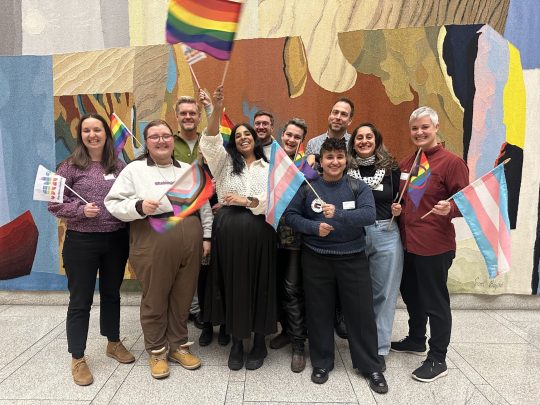
"Conversion therapy is an unacceptable interference in people's sexual orientation and gender identity, which destroys lives. Now it will finally be banned," said Norwegian Culture and Equality Minister Anette Trettebergstuen this summer.
The ban affects "anyone who offends another by using psychotherapeutic, medical, alternative medicine or religiously based methods or similar systematic procedures, with the intention of influencing the person concerned to change, deny or suppress their sexual orientation or gender identity".
The ban also applies to Norwegian citizens offering such treatments outside Norway.
The Norwegian parliament, Stortinget, passed the ban on December 12, with 85 votes against 15.
Hilde Arntsen, leader of the Norweigan LGBTQ organization FRI, says:
"Today we celebrate that it is finally illegal to try to convert us. We as queers have always known this – we cannot be converted."
The Ministry of Culture and Equality has more.
Photo from FRI.
#transgender#trans#lgbt#lgbtqa#queer#nonbinary#gay#lesbian#bisexual#lgbtq#conversion therapy#politics
101 notes
·
View notes
Text
Eliel Cruz for Teen Vogue:
When I was a teenager in the early aughts, conversion therapists reigned supreme in evangelical Christian spaces, spewing pseudo-scientific techniques as a supposed “remedy” for LGBTQ identities. Growing up in the Seventh-day Adventist church and school system, LGBTQ identities were vilified and demonized at the pulpit and in our classrooms. The answer to our sexualities, according to the church, was to deny ourselves love or a partner, stay celibate, or to work on “changing” our sexuality so that we were no longer queer. There were groups and conferences with self-proclaimed “ex-gay” speakers providing testimonies about how they “overcame” their sexuality and therapists eager to “help” others pursue the same path.
According to a Williams Institute report, 7% of LGB adults ages 18 to 59 in the United States have undergone conversion therapy. About 81% of those individuals were in “therapy” with religious leaders, which heightened suicidal thoughts and ideation in comparison to LGB people who have not gone through conversion “therapy” practices. Across the globe, these numbers fluctuate between 2% all the way up to 34% of LGBTQ+ people having undergone conversion practices.
By the mid-2010s, these groups and their influence began to dwindle as national organizations like Exodus International, one of the longest-running and largest ex-gay organizations, shuttered its doors after 37 years, admitting that not only did conversion or reparative therapy not work, it was harmful to the LGBTQ people subjected to it. Former Exodus International President Alan Chambers said: "I am sorry for the pain and hurt many of you have experienced. I am sorry that some of you spent years working through the shame and guilt you felt when your attractions didn't change,” admitting his own attractions to men had not gone away, despite being married to a woman and having children.
The closing of Exodus International signaled the end of a decades-long push for ex-gay therapy, or so it would seem. But in recent years, as legislation has passed across the country to ban conversion therapy for youth, a new push for so-called “change therapy” has re-emerged with the same flawed premise and tactics of the ex-gays of old. A group called Changed Movement, formed in response to legislation banning conversion therapy in California, is one such group using new language to promote the same-old conversion therapy.
Conversion or reparative therapy, loosely defined, is any attempt to influence and change someone’s sexual orientation or gender identity. Often, these counselors blame trauma or violence, family dynamics, or your upbringing as the root of the deviant sexuality or gender identity. Changed Movement shares stories of individuals blaming these roots as the cause of their sexuality or gender. This assertion is false and only serves to shame the individual, often for reasons beyond their control. Importantly, ex-gay groups like the Changed Movement do not seem to reckon with the fluidity of sexuality and gender and, as proponents of this ideology typically do, seemingly view things as either gay or straight, trans or cisgender.
[...]
In a report by the Trevor Project, researchers found at least 1,320 conversion therapy practitioners in almost all 50 states, including states with active conversion therapy bans for minors. Almost half of those counselors are unlicensed, and most are attached to some sort of religious ministry. While couching their language and pretending to be there to help LGBTQ people, the danger of these groups and practitioners cannot be understated.
Recently, an ex-gay group called Coming Out Ministries bought a building across from my alma mater, Andrews University, a Seventh-day Adventist University, intending to “work closely” with the university on LGBTQ issues “from a redemptive perspective.” Groups like Changed Movement and Coming Out Ministries see LGBTQ young people’s identities as “confusion” instead of who they are intrinsically. Their ideology stems from a theological understanding of sexuality that does not take into account science or the world as it exists around them. Anti-LGBTQ theology fuels conversion therapy, and it’s not only flawed but also inherently harmful and violent.
As a queer person of faith, I reject theology and religious practices that cause harm, as it is not from God. The history and devastating impacts of ex-gay practices are clear in the irreparable damage it has caused to large swathes of the LGBTQ community raised in religious settings.
Eliel Cruz writes in Teen Vogue the changing history of anti-LGBTQ+/anti-trans medical pseudoscience practice of conversion therapy.
#Conversion Therapy#Ex Gay#LGBTQ+#Transgender#Religion#Changed Movement#Exodus International#Coming Out Ministries
32 notes
·
View notes
Text
Published: Oct 24, 2023
I was around 10 the first time my mother asked if I thought I was a boy.
There was a period from the 1970s-1990s where the concept “tomboys”, although perhaps originally intended as a derogatory term, provided a space for pre-pubescent girls to act, play and dress in ways that were not stereotypically coded feminine; in other words, some of the freedoms boys were granted. My mother clearly felt that raising a daughter and a son should be drastically different experiences. This was not largely the case, as I wanted to be just like my older brother.
Growing up, my parents had strict ideas around the roles of men and women in society. Men were “head of the household” and had the final say on decisions, as well as being the primary disciplinarian; women’s primary roles were as caregivers. My parents were religious, raising me in a religion where homosexuality was taught to be immoral and unnatural.
In some ways, I fulfilled many stereotypes of feminine attributes: being gentle, soft-spoken, and nurturing towards others. I enjoyed playing with dolls and soft toys; however I also had a keen interest in cars and transformers. As a painfully shy child, I preferred the company of fictional characters in books more than people; this level of social awkwardness alone cast me as “odd”.
However, what had been convenient and financially fiscal - hand-me-down clothing from my brother - had become my clothing of choice. I only wanted to wear “boys’ clothing”, much of which came in my favourite colour (blue) versus the bright warm colours of “girls’ clothing”. Having worn both, I had realised that boys’ clothing was looser fitting, had more flexibility of motion, and was more comfortable. I disliked glitter, sequins, lace and frills, none of which was found on boys’ clothing. As a very shy child who refused to wear the clothing supposedly designated for my sex, this often invoked commentary and disapproval from adults around my appearance and my body. Boys’ clothing, with its longer sleeves and longer torso, covered up more of my body; a body I was painfully aware that others were observing and judging, sometimes openly.
My mother had told me how excited she was when she learned she was going to have a daughter to “do girly things with”, fantasising of frilly dresses and ballet rehearsals. Instead, she had me. Although my parents allowed me to play with the same toys as my brother, pursue the same sport as my brother, and (eventually) choose my own clothing, my mother’s question showed that she still didn’t understand: “Do you think you’re a boy?” My mother, likely feeling that she had been short-changed around the perks promised with raising a girl, could not understand how her daughter, who declined most things coded feminine, could indeed be a girl who was comfortable with this fact. 10 year old me didn’t understand just how loaded the question was, but did find it strange and hurtful, replying, “No, I’m a girl” in a confused tone.
Thankfully, as the concept of “tomboy” was popular while I was growing up, this meant there was a known word that described the type of girl I was; one that allowed me to know that, no matter what I liked or did, I was still a girl.
There was another word that described the type of girl I was. I was around 8 the first time I heard the word “gay”. A boy slightly older than me had spit the word out, yelling at another child “I’m not gay!” This caught my interest. Although the word itself was unknown, the meaning had been clear with the derision and emphasis the boy had placed on the word, his face consorting in disgust as the word left his mouth. It must be something really bad was the clear impression.
I had the opportunity to quench my curiosity that same week. In line with other tasks that could be deemed naughty, looking up bad words in the dictionary required careful timing to when family members were distracted elsewhere. I timed my moment carefully and looked up “gay”, which naturally led to my learning the term “homosexual” - oh. Reading the definition, it was almost like a warm recognition spread across my chest, embracing me. I hadn’t known that homosexuals existed, but I was pretty sure I was one. After this, I would sometimes sneak out the dictionary just to read these words again; although just ink on paper, it was proof that other people like me existed.
I would later use this word - gay - against myself, turning it from something comforting and wonderful, to the same kind of contempt that shrouded the word whenever I heard others use it in real life. Laying in bed at age 11, I had prayed to not be gay, promising myself that I would never tell anyone about these feelings and grow up to marry a man. Although it had been fine when my feelings towards certain girls had just been an intense desire to be their friend and be near them, these feelings had become much harder to ignore now they had turned into more concrete thoughts, such as how beautiful a certain girl was, how shiny and luscious was her hair, and daydreaming around our hands accidentally touching. It was much harder to deny the very clear signs of a crush, particularly when all my female friends had crushes on boys. In order to fit in, I focused my energies on talking about how “cute” one of the boys in the class was - I had never interacted with him, however he had soft features and long eyelashes, and seemed gentle in nature. I would then go home and dream about my female friend and her lovely, long dark hair.
Coming into puberty, I had also started learning more about my religion’s views on homosexuality, specifically that it was immoral and unacceptable. This led to a lot of emotional hurt and confusion for me. At this point, homosexuals may as well have been mythical creatures, discussed by others, but never appearing as an identifiable person in real life.
* * *
Several years older, 15 year old me was struggling. Since puberty, I had been trying to push away any inkling of desire I had towards other girls.; it hadn’t worked. Now with slightly more understanding around the world and how I fitted into it, I had started the process of accepting that these feelings weren’t going anywhere and were, perhaps, just a normal part of me. I had also started considering that if I had been created with intent, as my religion taught, then no mistakes were possible, and my attraction towards girls, which had always been there in some form, was as natural and as similar as anyone else’s. Although it had improved, my social awkwardness still made me frequently feel like an outsider, with my secret and furtive crushes on other girls further making me feel different in a way I couldn’t discuss with anyone. This feeling would decrease when I eventually met other lesbians, however this wouldn’t happen for several years.
I had started to shop in the women’s department, and outgrown my obsession with cars, instead falling into an obsession with music; something familiar to many teenagers. Still, I preferred comfortable clothing that would be classed as “gender neutral”: jeans, baggy t-shirts, converse shoes. I wore my mid-length hair messy, fantasising about the short hairstyles lesbian duo Tegan and Sara sported. I spent a lot of time listening to music with female musicians who played guitar, preferring artists who openly sung about and desired other women, or those who sang with ambiguity in their love songs, allowing me to place my own meaning on them. My penchant for female musicians had not escaped the notice of my friends, who gently teased me about it, although they didn’t seem to understand the cause for this fixation.
Again, now a teenager, the same question from my mother, phrased slightly differently this time: “do you feel like you’re a man?” I remember telling my friend about this at a sleepover the same night - her response was silence. She didn’t know what to say.
* * *
Several years passed. I was now an out lesbian with a rainbow flag proudly adorning the wall of my share-house bedroom. This included being out to my parents, who had taken the news reasonably well and had been supportive. Having a friendly gay male couple move into their neighbourhood in my late teenage years had significantly increased their understanding and acceptance of homosexual relationships - and had allowed me to finally meet others “like me”. I had fulfilled my fantasy of cutting off the majority of my hair, with the longest section being a fringe that flopped into my eyes. I had also gone back to shopping in the men’s wear section, though my wide hips and narrow shoulders made finding men’s clothing that fit me well difficult. I had finally had my first kiss, although not yet a girlfriend, though most of my time was spent dreaming about this.
My parents had reassured me that they loved and accepted me when I told them I was a lesbian. They had continued to reaffirm this in the following months, however despite this acceptance, my mother showed that she still doesn’t understand, asking me the same question again, some months after I came out: “do you want to be a man?” It was as if every five years, the thought occurred to her again that I must have gender identity disorder because of the way I looked and acted.
I’m in my late 20s now. I have been an out lesbian for a decade, and have had several girlfriends, although my current relationship is by far the longest. My parents adore my girlfriend, buying her birthday presents, and always letting me know how much they approve. My mother comments on how nice my girlfriend’s dresses are and how much she likes her long hair, telling me, “you would look so nice in that”. I feel fatigued with a lifetime of trying to convince her I am genuinely comfortable like this, and tired of defending my short hair, which is my favourite part of my appearance. My girlfriend gets angry on my behalf whenever my mother makes these comments, defending me and saying she thinks I look beautiful as I am.
I am thankful that I never came across the often repeated and homophobic rhetoric that only boys like girls, and therefore lesbians are actually just straight males on the inside. My conviction of my own self, that I am a girl who likes girls, has protected me in this way, but may not have had I had been born a decade later, where it seems many young girls similar to myself are being taken to gender clinics. Or that my mother’s conviction that I am secretly a transman - which has been a reoccurring theme across my life so far - could have caused consultation with a medical professional to convince me of this very fact; something that, as a child who felt different and never seemed to fit, I am sure I would have trusted the adult expert’s views on.
Somehow - bewilderingly - now almost 30, my mother again asks me if I feel like I’m a man and if I’m actually trans. I explain as patiently as I can that no, I’m a lesbian woman and it’s hurtful to me that she seems to refuse to truly accept this, questioning whether I can be a woman because I don’t match her view of what a woman looks like.
She listens to my words and apologises, saying she thinks she understands now. I can’t help but wonder if we’ll be having this same conversation in another five years.
==
It's weird that they would prefer that their god made a "mistake" and put her in "the wrong body," than that their god doesn't make mistakes, and that she's who he wants her to be.
It's a bad sign when a far-left ideology and a conservative religious view coincide.
#LGB Alliance#lesbian#same sex attraction#trans the gay away#trans away the gay#save the tomboys#gay conversion therapy#conversion therapy#gender ideology#queer theory#genderwang#religion#born in the wrong body#in the wrong body#religion is a mental illness
108 notes
·
View notes